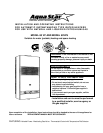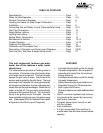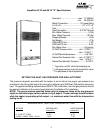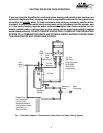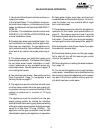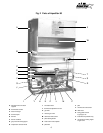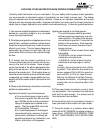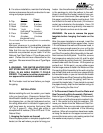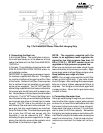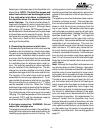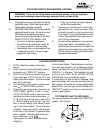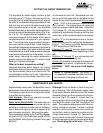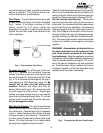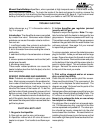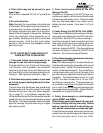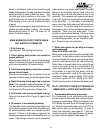
5
RULES FOR SAFE OPERATION
1. You should follow these instructions when you
install your heater.
In the United States: The installation must con-
form with local codes or, in the absence of local
codes, the National Fuel Gas Code ANSI Z223.1/
NFPA 54.
In Canada: The installation should conform with
CGA B149.(1,2) INSTALLATION CODES and/
or local installation codes.
2. Carefully plan where you install the heater. Cor-
rect combustion air supply and flue pipe instal-
lation are very important. If a gas appliance is
not installed correctly, fatal accidents can result
from lack of air, carbon monoxide poisoning or
6. Keep water heater area clear and free from
combustibles and flammable liquids. Do not lo-
cate the heater over any material which might
burn, such as carpet.
7. Correct gas pressure is critical for the optimum
operation of this heater (see specifications on
page 3). Gas piping must be sized to provide
the required pressure at the maximum output of
the heater. Check with your local gas supplier,
and see gas line size requirements on page 27.
8. As a precaution, shut off your heater if you plan
to be away for several days.
9. Should overheating occur and the gas supply
fail to shut off, turn off the manual gas control
valve to the appliance.
10. See instructions on setting the water tempera-
ture, page 12.
11. Do not use this appliance if any part has been
under water. Immediately call a qualified service
technician to inspect the appliance and to replace
any part of the control system and any gas con-
trol which has been under water.
fire.
3. The place where you install the heater must
have enough ventilation. The National Fire Codes
do not allow water heater installation in bath-
rooms, bedrooms or any occupied rooms nor-
mally kept closed. See the section on Pages 7-8
on Locating the Heater.
4. You must vent your heater. See section on Vent
Pipe Connection, Page 10, paragraph 6 and
Venting Guide on page 27.
5. The appliance and its individual shutoff valve
must be disconnected from the gas supply pip-
ing system during any pressure testing of that
system at pressures in excess of 1/2 psig
(3.5kPa).
The appliance must be isolated from the gas
supply piping system by closing its individual
manual shutoff valve during any pressure testing
of the gas supply piping system at test pressures
equal to or less than 1/2 psig (3.5kPa). The
appliance and its gas connection must be leak
tested before placing the appliance in operation



